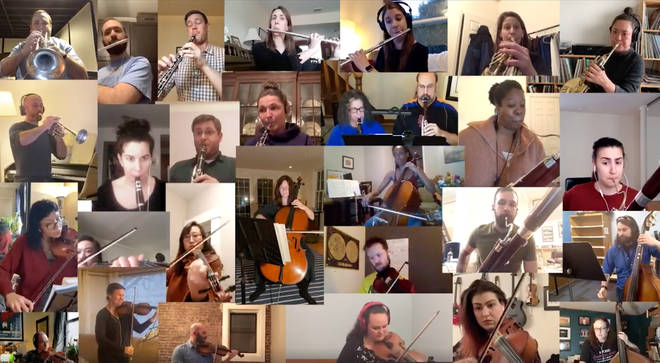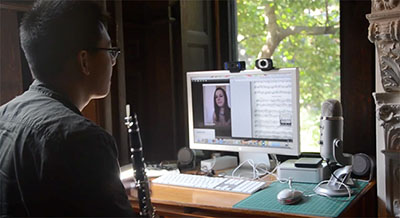
Self-isolating orchestra performs ‘Ode to Joy’ through video editing technology © Filmelodic
There is no question that the coronavirus pandemic has had a profound effect on our daily lives, and its effect and after-effects will continue to be felt for many months and possibly years to come.
For musicians, the effect of the shutdown of cultural life around the globe was immediate, and, for many, shocking, leading to an almost instant loss of work and income, and a genuine existential crisis. For the performing musician, their very identity is threatened without the validation that concertising brings them. And in a rush to remind us, and them, of their role and their raison d’être, no sooner had the concert venues and opera houses closed than musicians, determined to keep the music playing, started livestreaming concerts from their homes, or joining forces with colleagues via platforms like Zoom to play in ensemble, or using video applications and clever editing to play ensemble with themselves, with some very interesting results.

Musicians such as Maxim Vengerov started livestreaming concerts at home © Classic FM
For those of us who love live music, and for the musicians who love to perform, we are eagerly awaiting the reopening of concert venues when our governments deem it safe to do so. I was pleased to receive the Wigmore Hall’s autumn season brochure, its programme enticingly crammed with a wonderful selection of concerts and artists. It has announced it will reopen in September and I fervently hope that it does, but the challenge for venues like the Wigmore will be squaring the tricky circle of social distancing and the logistics of managing some 500 people within a fairly small space. It remains to be seen how venues will organise this.
Meanwhile, this period of enforced isolation has undoubtedly given musicians time to reflect on their careers and their approach to their music making, and may presage a shift in the way things are done in future. For some, it is already apparent that they cannot rely solely on concertising as their main source of income; for those of whom teaching provides a regular income stream, the ability to continue to teach online has been a lifeline during these testing times. Others have had to take the uncomfortable decision to seek work outside the profession; this can have a negative impact on one’s identity as a musician, but perhaps that is a small price to pay when one also has bills to pay.

Some musicians switched to online teaching © www.knieveltour.com
On a more positive note, it will be interesting to see the effect of all these “at home” concerts and a far more relaxed presentation of classical music on audiences, both current and potential. In these online performances, audiences encounter musicians in a different setting, away from the formality of the concert hall with all its traditions and etiquette, and such encounters are an important reminder to audiences that musicians are in fact ordinary people (even if they do extraordinary things!). They also create important connections between musician and audience. Platforms such as YouTube or Vimeo, and social media networks like Twitter, allow audiences to interact far more directly and less formally with musicians in a way that is rarely possible in the green room at a concert venue. Musicians are also finding new ways of creating programmes, for example by polling audiences via platforms like Twitter and asking them to suggest the pieces they might play. This too creates an important connection between artist and audience and gives audiences a greater sense of participation.
For too long classical music has suffered from the reputation of being elitist, inaccessible and for the educated few not the many. It is encouraging to think that a change in the way music is presented, forced by the coronavirus crisis, may inspire some new ways of presenting classical music when the venues reopen.





Interlude is always full of highly interesting articles. Thank you !
Thank you Margaret!
Gracias interlude!